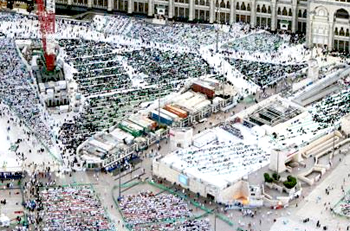
Mount Arafat, July 30: Muslim pilgrims converged Thursday on Saudi Arabia's Mount Arafat for the climax of this year's hajj, the smallest in modern times and a sharp contrast to the massive crowds of previous years.
A tight security cordon has been erected all around the foot of the rocky hill outside Mecca, also known as Jabal al-Rahma or Mount of Mercy.
Pilgrims, donning masks and observing social distancing, were brought in buses from neighbouring Mina, state television showed, as Saudi authorities impose measures to prevent a coronavirus outbreak.
They were subject to temperature checks and attended a sermon -- which state media said was translated into 10 languages -- before they set off on the climb to the summit for hours of Koran recitals and prayers to atone for their sins.
The scene was strikingly different to last year's ritual when a sea of pilgrims ascended Mount Arafat, marshalled by tens of thousands of stewards in a bid to prevent any crushes.
After sunset prayers, pilgrims will make their way down Mount Arafat to Muzdalifah, another holy site where they will sleep under the stars to prepare for the final stage of hajj, the symbolic "stoning of the devil".
It takes place on Friday and also marks the beginning of Eid al-Adha, the festival of sacrifice.
The hajj, one of the five pillars of Islam and a must for able-bodied Muslims at least once in their lifetime, is usually one of the world's largest religious gatherings.
But only up to 10,000 people already residing in the kingdom will participate in this year's ritual, compared with 2019's gathering of some 2.5 million from around the world.
"You are not our guests but those of God, the custodian of the two holy mosques (Saudi Arabia's King Salman) and the nation," Hajj Minister Mohammad Benten said in a video released by the media ministry on Wednesday.
Security cordon
A security cordon has been thrown around the holy sites to prevent any security breaches, an interior ministry spokesman said.
Riyadh faced strong criticism in 2015 when some 2,300 worshippers were killed in the deadliest stampede in the gathering's history.
But this year, those risks are greatly reduced by the much smaller crowd.
The pilgrims have all been tested for the virus, and foreign journalists were barred from this year's hajj, usually a huge global media event.
As part of the rites completed over five days in the holy city of Mecca and its surroundings, the pilgrims converged on Mount Arafat after spending the night in Mina.
A district of Mecca, Mina sits in a narrow valley surrounded by rocky mountains, and is transformed each year into a vast encampment for pilgrims.
They began the hajj on Wednesday with their first "tawaf", the circumambulation of the Kaaba, a large structure in Mecca’s Grand Mosque towards which Muslims around the world pray.
The Kaaba is draped in a black cloth embroidered in gold with Koranic verses and known as the kiswa, which is changed each year during the pilgrimage.
Pilgrims were brought inside the mosque in small batches, walking along paths marked on the floor, in sharp contrast to the normal sea of humanity that swirls around the Kaaba during hajj.
.jpg)
.jpg)
 Jeddah, Jul 23: Authorities at Makkah and Madinah have reported a lower-than-expected turnout of worshippers who have registered for “itikaf” (total seclusion) at the Grand Mosque and Prophet’s Mosque. Thousands of Muslims confine themselves to mosques across the Kingdom during the last ten days of Ramadan.
Jeddah, Jul 23: Authorities at Makkah and Madinah have reported a lower-than-expected turnout of worshippers who have registered for “itikaf” (total seclusion) at the Grand Mosque and Prophet’s Mosque. Thousands of Muslims confine themselves to mosques across the Kingdom during the last ten days of Ramadan.





.jpg)
.jpg)

Comments
Add new comment